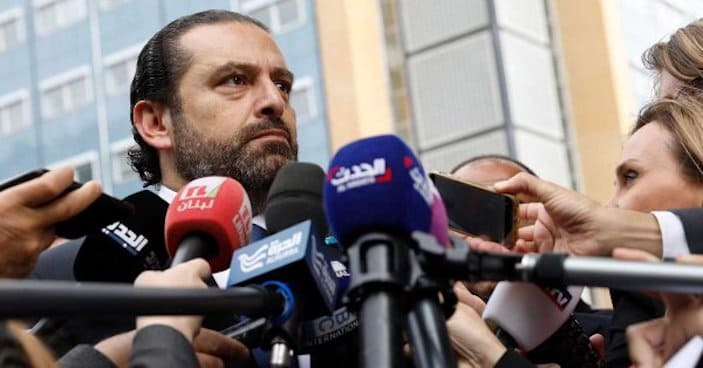New US legislation relating to the Iran-backed group casts a shadow over the future of bilateral relations
News that a new government may soon be formed will cheer many in Lebanon, who are increasingly anxious about the dire economic situation in the country. Until a government takes office, Lebanon will remain in limbo while awaiting urgent policies to address its ballooning public debt.
However, a new government could conceivably represent a headache for the Lebanese, at least if the prime minister-designate Saad Hariri chooses to appoint a Hezbollah figure to be health minister, as seems likely. Legislation passed by the US Congress and signed by President Donald Trump last week explains why.
The amended legislation threatens to sanction individuals who knowingly assist, support, recruit, or fundraise for Hezbollah. More significantly, it also sanctions “agencies of foreign governments” that provide the party with arms, financial support, or other forms of assistance. And it also increases sanctions on Hezbollah’s criminal networks, including alleged drug trafficking networks.
Following Lebanon’s parliamentary elections last May, US officials in Beirut made it clear to Mr Hariri that they would oppose a decision to hand the health ministry to a member of Hezbollah. Their argument was that at a time when the United States was tightening the screws on Iran and Hezbollah, America would not take kindly to a decision that gave the party significant patronage power. The ministry is often used by politicians or parties to provide free medical care to supporters, and can generate considerable political capital.
All the signs are that Mr Hariri has ignored these warnings. Hezbollah has insisted on the ministry for several reasons. First, with funding from Iran having diminished owing to US sanctions, the party needs other means to provide services to an electorate unhappy with its focus on Syria in the past five years. Moreover, with the economy in crisis and Hezbollah having to take care of its members injured in the Syrian conflict, a services ministry was seen as a priority.
The party also feels that the momentum is going its way. Hezbollah and its allies appear to have won in Syria, the results of the Lebanese elections were to its advantage, and now the party is seeking to capitalise on all this by demanding that seats in the government be reserved for its allies.
Where this will leave Lebanon, however, is uncertain. One passage in the US legislation should make Lebanese officials wary. It refers to the sanctioning of “certain instrumentalities and agencies of foreign states”, and sets as a condition that the agency in question must have “provided significant financial support for or to, or significant arms or related materiel to” Hezbollah.
Would Washington consider free healthcare to Hezbollah members provided by the health ministry as an example of “significant financial support”? It’s difficult to say that it would never do so. Moreover, there has been talk that if the US takes measures to block the export of medicines to the ministry, Iran would step in to supply medicines of its own − a move that would anger the Trump administration.
The sanctions, as outlined in the legislation, are described as the exercise of powers “to the extent necessary to block and prohibit all transactions in all property and interests in property of an agency or instrumentality of a foreign state if such property and interests in property are in the United States, come within the United States, or are or come within the possession or control of a United States person”.
Behind the dry, bureaucratic language, the legislation effectively indicates that if the Trump administration were to sanction the health ministry, the US might seek to prevent dollar transactions in which the ministry engages. This could affect the wide network of hospitals and medical providers with which it works, and it is conceivable that many companies would simply refuse to work with the ministry.
However, there is more to this situation than what happens to the ministry. In recent years, the United States has continued to provide aid to the Lebanese army and state, despite protests from some quarters in the US who affirm that Lebanon and Hezbollah are one and the same. There remains goodwill towards Beirut in the US capital, but it is hardly etched in stone. Placing a Hezbollah minister over the health ministry could alter this favourable mood considerably.
Once that happens, it will take a great deal to bring relations back to normal. Lest the Lebanese forget, the US significantly downgraded its involvement in Lebanon in 1984, and it took more than a decade for it to fully re-engage with the state. Lebanon is highly dependent on dollar transactions, an open economy, and the travel of its citizens to and from the US, so it makes no sense for it to alienate Washington, especially at a time when it has lost so much of the backing it once had among Gulf states.
It’s unclear what motivated Mr Hariri to ignore the American counsel, particularly when he has spent the past five months heeding each and every condition from his partners in government. The prime minister-designate may feel he doesn’t owe anything to Washington, but nor is a financially debilitated Lebanon capable of weathering a clash with a superpower. If his decision brings the Lebanese new woes, he will have only himself to blame.
Michael Young is editor of Diwan, the blog of the Carnegie Middle East programme, in Beirut

